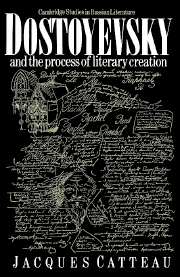Book contents
- Frontmatter
- Contents
- Preface to the English edition
- List of abbreviations
- General editor's note on transliteration and references
- General introduction
- PART I The creative environment
- PART II The process of creation
- Part III Time and space in the world of the novels
- Conclusion
- Notes
- Select bibliography
- Index of names
General introduction
Published online by Cambridge University Press: 18 December 2009
- Frontmatter
- Contents
- Preface to the English edition
- List of abbreviations
- General editor's note on transliteration and references
- General introduction
- PART I The creative environment
- PART II The process of creation
- Part III Time and space in the world of the novels
- Conclusion
- Notes
- Select bibliography
- Index of names
Summary
Dostoyevsky's world is a vast universe, far beyond the grasp of any one reader. This book is not an attempt to make a synthesis of the universe of his works. Vyacheslav Ivanov and Mikhail Bakhtin, who focus on Dostoyevsky's poetic vision, and Leonid Grossman, Konstantin Mochulsky and Pierre Pascal, whose subject is Dostoyevsky's life and works, are the best of many writers who have tried to do so. But no book can include everything; in particular, it may fail to convey the totality which is the essence of Dostoyevsky's work. Most books devoted to the novelist rip the seamless web to pieces.
How can we preserve a sense of plurality in unity without attempting a synthesis? Perhaps we shall find the answer by analysing the reasons which make a perfect synthesis impossible.
There are roughly three main tendencies in Dostoyevsky studies. In the first, the novelist is overshadowed by the philosopher, prophet and seer, who debates abstract and eternal questions throughout his works: good and evil, God and Christ, socialism and revolution, the Golden Age, the future city, the freedom of man. These problems are so finely balanced and debated with such incandescent passion that philosophers of various schools – Rozanov, Merezhkovsky, Shestov, Berdyayev, Camus – have made forays into Dostoyevsky's works to carry off the heroes best suited to their own systems. As Bakhtin says:
If we consider the vast literature devoted to Dostoyevsky, it may seem that we are not discussing a novelist writing novels and stories, but a series of arguments set out by different philosophers, such as Raskolnikov, Myshkin, Stavrogin, Ivan Karamazov, the Grand Inquisitor, and so on. […]
- Type
- Chapter
- Information
- Dostoyevsky and the Process of Literary Creation , pp. 1 - 4Publisher: Cambridge University PressPrint publication year: 1989



